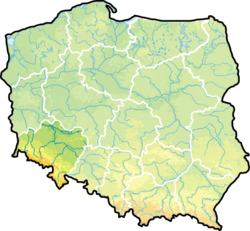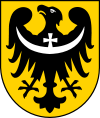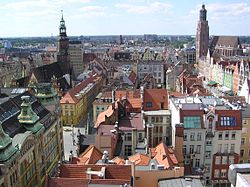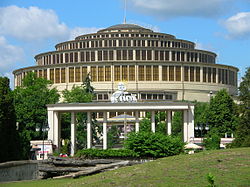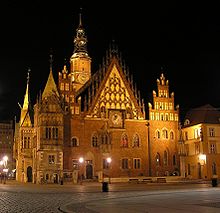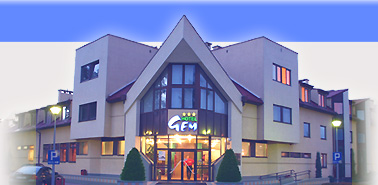Poland, officially the Republic of Poland (Polish: Rzeczpospolita Polska), is a country in Central Europe, bordered by Germany to the west; the Czech Republic and Slovakia to the south; Ukraine, Belarus to the east; and the Baltic Sea and Kaliningrad Oblast, a Russian exclave, and Lithuania to the north. The total area of Poland is 312,679 square kilometres, making it the 69th largest country in the world and the 9th largest in Europe. Poland has a population of over 38.5 million people, which makes it the 34th most populous country in the world and the sixth most populous member of the European Union, being its most populous post-communist member. Poland is a unitary state made up of 16 voivodeships. The establishment of a Polish state is often identified with the adoption of Christianity by its ruler Mieszko I in 966, over the territory similar to that of present-day Poland. The Kingdom of Poland was formed in 1025, and in 1569 it cemented a long association with the Grand Duchy of Lithuania by signing the Union of Lublin, forming the Polish–Lithuanian Commonwealth. The Commonwealth ceased to exist in 1795 as the Polish lands were partitioned among the Kingdom of Prussia, the Russian Empire, and Old Austria. Poland regained its independence as the Second Polish Republic in 1918. Two decades later, in September 1939, World War II started with the Nazi Germany and Soviet Union invasion of Poland (Molotov–Ribbentrop Pact). Over six million Polish citizens died in the war. The People's Republic was declared in 1952 although Poland was a client state of the Soviet Union from 1944. During the Revolutions of 1989, the communist state was overthrown and democratic rule was re-established in the form of the current Poland, constitutionally known as the "Third Polish Republic". Despite the vast destruction the country experienced in World War II, Poland managed to preserve much of its cultural wealth. There are currently 14 heritage sites inscribed on the UNESCO World Heritage list in Poland. Since the end of the communist period, Poland has achieved a "very high" ranking in terms of human development. LOWER SILESIAN VOIVODESHIP
Although much of the region is relatively low-lying it also includes part of the Sudetes mountain range running along the Polish/Czech border. Popular ski resorts in Lower Silesian Voivodeship include Karpacz and Szklarska Poręba in the Karkonosze mountains. The town of Kudowa Zdrój, also in the Sudetes (west of Kłodzko near the Czech border), is a traditional spa town often visited by heart patients. Other important tourist destinations in the voivodeship include the chief city, Wrocław, as well as the towns of Jelenia Góra and Legnica. The town of Boleslawiec is famed for its pottery.
The city's name was first recorded as "Wrotizlava" in the chronicle of Thietmar of Merseburg (11th century), which mentions it as a seat of a newly installed bishopric in the context of the Congress of Gniezno. The first municipal seal stated Sigillum civitatis Wratislavie. A simplified name is given, in 1175, as Wrezlaw, Prezla or Breslaw. The Czech spelling was used in Latin documents as Wratislavia or Vratislavia. At that time, Prezla was used in Middle High German, which became Preßlau. In the middle of the 14th century the Early New High German (and later New High German) form of the name, Breslau, began to replace its earlier versions. The city is traditionally believed to be named after Wrocisław or Vratislav, often believed to be Duke Vratislaus I of Bohemia. It is also possible that the city was named after the tribal duke of the Silesians or after an early ruler of the city called Vratislav. The city's name in various other languages is: Hungarian: Boroszló, Czech: Vratislav, German: Breslau Hebrew: ורוצלב (Vrotsláv), Yiddish: ברעסלוי (Brasloi), Silesian German: Brassel, and Latin: Vratislavia or Budorgis[2] or Wratislavia. The city's name in other languages is available at the list of names of European cities.
The National Museum at pl. Powstańców Warszawy, one of Poland's main branches of the National Museum system, holds one of the largest collections of contemporary art in the country. The great popular sightseeing ships White Fleet, floating on the Oder. Frequent destinations for tourists visiting Wrocław is also nearby mountain Ślęża.
The hotel ensures comfort to the people who like peace and friendly atmosphere. The visitors from all over the world - businesspersons, politicians and artists – come to stay in our hotel. We have many regular and welcome guests among them. It is in an ideal location for those who value peace and quiet. The hotel has 55 rooms and 3 air-conditioned apartaments. The rooms have access to wireless internet. Full-board accommodation is offered in the following hotels with special rates (Students hotels located 1 km from the Venue):
The above rates are per person and per night, and include insurance and all taxes. Reservations All hotel room reservations must be made through:
|
